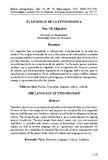El lenguaje de la etnobotánica

View/
Date
2012-11-01Author
Palabras Clave
Plantas, Diversidad, Lenguaje, Cultura, Símbolo.Plants, Diversity, Language, Culture, Symbolic
Metadata
Show full item recordAbstract
Los vegetales han acompañado e influenciado estrechamente la historia del hombre. Por su gran diversidad de usos y funciones en la cotidianidad, se plantea que en gran medida su presencia ha sido vital y determinante para el desarrollo e la cultura humana. La relación humano-planta, constituye un elemento esencial en la conformación de la cosmovisión de los pueblos. La forma de pensar, nombrar, sembrar, usar y representar los vegetales, está incorporada a los diversos sistemas de saberes, que necesariamente requieren de un lenguaje oral o escrito, para su significación y permanencia. En la contemporaneidad es imprescindible integrar al estudio de la diversidad cultural y de lenguajes, la diversidad de concepciones, manejo y representación sobre las plantas.
Collections
Información Adicional
| ISSN | 1325-2610 |
| Resumen en otro Idioma | Vegetables have been associated with and influenced human history in a direct way. Because of their wide range of uses and purposes in everyday life, it is suggested that much of their presence has been vital and crucial for the development of human culture. The human being – plant relationship is an essential element in shaping people’s worldview. The way people think about, name, sow, use, and represent vegetables, is included into various systems of knowledge, which unavoidably require an oral or written language for its significance and permanence. At present time, it is mandatory to integrate the diversity of ideas, management and representations of the plants to the study of cultural and language diversity. |
| Colación | 159-175 |
| Periodicidad | cuatrimestral |
| País | Venezuela |
| Publicación Electrónica | Boletín Antropológico |





